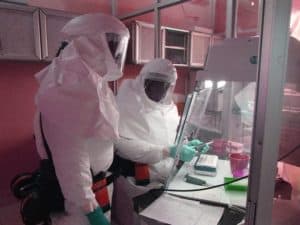
Biological warfare lab Credit: Department of Defense
Research at a secretive Army germ warfare lab about 50 miles from Washington, D.C. that works with tularemia, which spreads more easily than anthrax, has been partially restarted after a federal inspection found two failures in containing unnamed germs or toxins.
No one was exposed to any germs or toxins at the U.S. Army Medical Research Institute of Infectious Diseases at Fort Detrick in Maryland, according to the institute commander. The institute, once the fiefdom of Sidney Gottlieb who conducted LSD mind-control experiments for the CIA, has a long history of safety lapses.
“Our concept is to start with a small group of people, secure approval for a limited number of studies, and then gradually expand,” said Col. E. Darrin Cox, the new commander of the institute.
The previous commander, Maj. Gen. Barbara Holcomb, who oversaw the lab when problems were found has retired.
The inspection also found the lab failed to implement safety procedures with lapses such as propping open a door while biohazard waste was removed.
In June, an inspection by the Centers for Disease Control and Prevention found leaks […]











Looks to me like there is an error in the headline…”re-opens”…apparently it had never actually closed but switched to defensive research over offensive…a distinction that I am sure is easily sidelined.
Foolish me. I thought we had actually pulled put of biological warfare
Actually, US biowarfare research has ONLY been focused on defensive measures since the Biological Weapons Convention of 1972/1975 (augmented by the 1989 “Bioweapons Anti-Terrorism Act” passed by Congress). During the time I was assigned to the Military District of Washington staff (and still today) Ft. Dietrick was under MDW’s purview. I have been involved in staff visits there and, though we didn’t specifically visit the lab, we did get classified briefings on its operations. They were all clearly defensive in nature, which is allowed by the Convention. (BTW, I recommend you read my reply to Stephan, above.)
Paul — I don’t know what you were briefed on but like you in the mid-70s as part of a working group, I got briefed in on the Ft. Dietrick program, as well as other research. I was horrified. It was clear that the difference between offensive and defensive is largely a matter of semantics not research. Then some years later I read Richard Preston’s The Hot Zone which, among other things, covered the origins of the Ebola virus. My views on this subject are nowhere near as benign and optimistic as yours.
You are correct, Stephan–you don’t know what I was briefed on. But given that my briefings were 2 decades more recent than yours, and that they were within my scope of ongoing responsibilities as part of the senior facility command–plus as part of my officer training I had various blocks of instruction on bio/chem warfare (significantly all of it involving defensive operations–which was not the case with our instruction in nuclear conflict, which covered both offensive and defensive measures), plus further instruction in my masters program in strategic intelligence–I’ll hazard a guess my opinion is somewhat better informed on this matter.
You are correct, Paul, I do not know how you were briefed, just as you do not know how I was briefed. The only thing I can say is that I was at flag level, very different than a captain, or major whichever you were. But the truth is neither one of us knows what will be going on in 2020. Only time will reveal that, and we will both have to wait and see.
Stephan–in your little op-ed introducing this article you seem to make the assumption that the research at Ft. Dietrick is for offensive purposes, even though the article itself explicitly mentions defensive purposes. Given the potential for weaponization of biological agents for use against us by threats, be they foreign or domestic, I would HOPE that we are doing biological warfare research. Indeed the government in general and the Army specifically (since that’s who has the mandate) would be shirking their duty if they WEREN’T doing such research. To do otherwise would be to make ourselves increasingly vulnerable to some very nasty surprises. I am frankly glad that they have restarted research into these deadly organisms, but also glad they were called on the carpet a few years ago for doing it sloppily. Given my past experience with other areas where the military was caught being less than rigorous in its behavior (notably experimentation on human subjects, and monitoring of US persons) and the resultant strong corrective measures taken, I think that we can expect things will be done at Dietrick to a much higher standard than previously, so this article is actually _good_ news.
We do need to defend ourselves from other entities from using chemical weapons on us. On the other hand I do not think we should ever use chemical weapons on others; it is immoral.